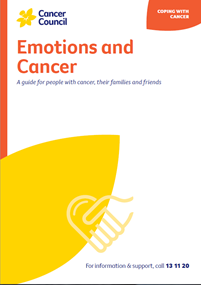- Home
- Cancer Information
- Coping with a diagnosis
- Emotions and cancer
- Getting support
- When do you need professional support?
When do you need professional support?
While almost everyone with cancer experiences distress at some point, it can be hard to know if how you are feeling is a typical reaction or something more serious. If you talk to a health professional about your concerns, they are likely to use a standard method to measure how you are feeling. For example, you may be asked to rate your distress over the past week on a scale of 0 to 10 (often known as a “distress thermometer”) and complete a checklist of problems.
Warning signs of anxiety and depression
At any stage after a cancer diagnosis, it is natural to have days when you feel sad or worried. Sometimes a person may begin to feel “stuck” in their distress and become anxious or depressed. If this is the case for you or someone you care about, it is important to seek help.
You may need to seek professional help if you:
- find it difficult to function on a daily basis
- have lost the desire to do things that previously gave you pleasure
- find you are feeling depressed most of the day, nearly every day
- begin to rely on alcohol or recreational drugs
- stop eating regularly (unless the loss of appetite is an expected side effect of the cancer treatment)
- are sleeping too much or having a lot of trouble sleeping
- are worried you might hurt someone because of your anger
- think about self-harm or taking your own life.
Anxiety and depression are quite common among people who have had cancer, but there is no need to face this experience alone. Talk to your cancer care team or GP and discuss whether counselling or medication – even for a short time – may help. You can also call Cancer Council 13 11 20, or get in touch with Beyond Blue on 1300 22 4636.
For 24-hour crisis support, call Lifeline 13 11 14.
If you are having intense thoughts about hurting yourself or others, seek immediate assistance by calling Lifeline 13 11 14. In an emergency, call Triple Zero (000).
Podcast: Coping with a Cancer Diagnosis
Listen to more of our podcast for people affected by cancer
More resources
A/Prof Anne Burke, Co-Director, Psychology and Allied Health Lead, Cancer, Central Adelaide Local Health Network and The University of Adelaide, SA; Hannah Chen, Psychologist, Cancer Council Queensland; Hazel Everett, Clinical Nurse Consultant, Cancer Services, St John of God Subiaco Hospital, WA; Shona Gates, Senior Social Worker, North West Cancer Centre, TAS; Dr Jemma Gilchrist, Senior Clinical Psychologist, Mind My Health and Crown Princess Mary Cancer Centre, Westmead, NSW; Sandra Hodge, Consumer; Dr Michael Murphy, Psychiatrist and Clinician Researcher, Prince of Wales Hospital, NSW; Caitriona Nienaber, 13 11 20 Consultant, Cancer Council WA; Dr Alesha Thai, Medical Oncologist, Peter MacCallum Cancer Centre, VIC; Alan White, Consumer.
View the Cancer Council NSW editorial policy.
View all publications or call 13 11 20 for free printed copies.
Need to talk?
Support services
Online Community
Check out this supportive online community for people affected by cancer
Cancer Connect
Talk to someone who has experienced cancer
Cancer information
Cancer and your finances
Learn how cancer can affect your finances, and how to manage this
Cancer, work and you
Learn how to cope with the impact that cancer may have on your work life


